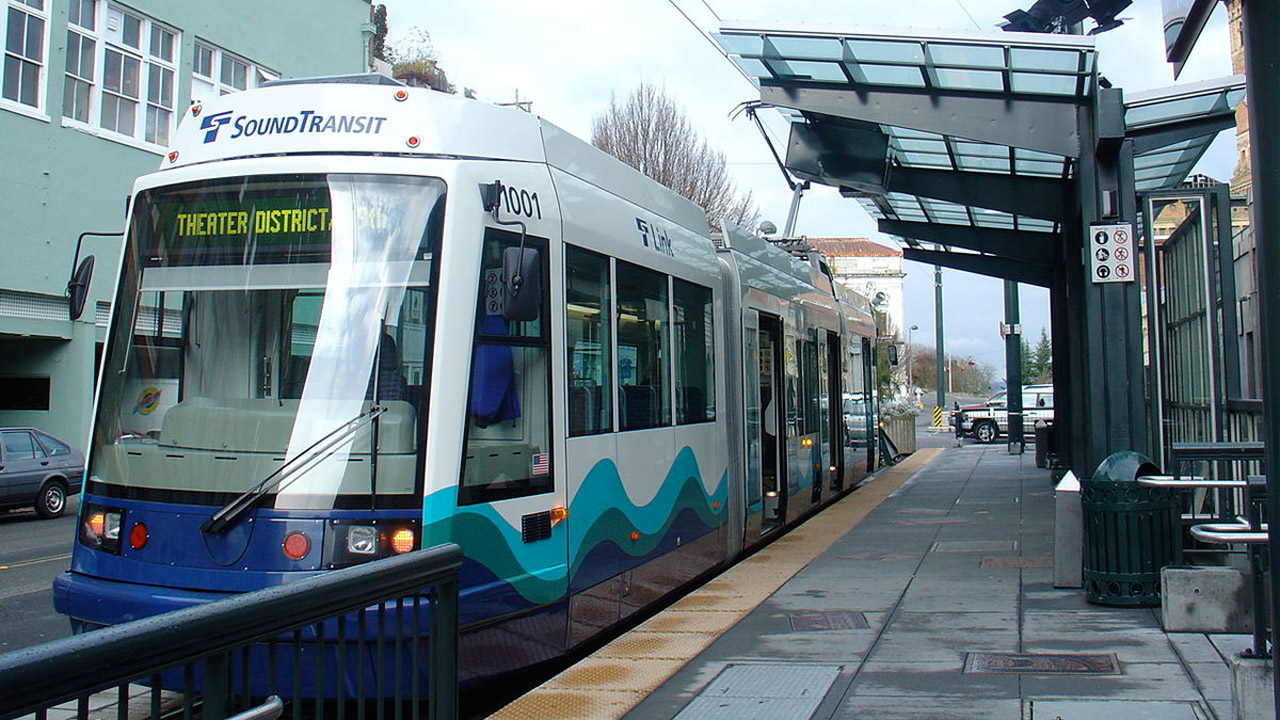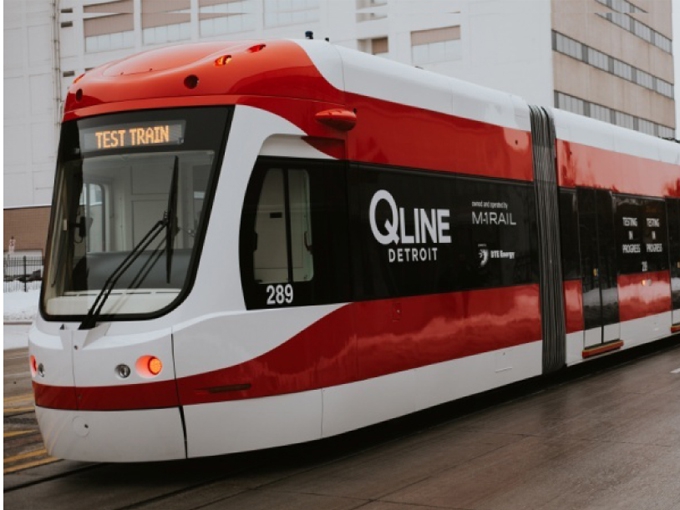
Transit Briefs: RTA, SEPTA, Sound Transit
Written by Carolina Worrell, Senior Editor
Wikipedia/Oran Viriyincy
The Regional Transit Authority (RTA) of Southeast Michigan weighs a takeover of the QLINE. Also, the Southeastern Pennsylvania Transportation Authority (SEPTA) Transit Police ends its strike with a tentative agreement; and Sound Transit receives Moody’s highest-possible bond ratings and moves to a new flat fare structure for its Link light rail.
RTA
RTA of Southeast Michigan is weighing a takeover of the QLINE, according to a Detroit Free Press report.
According to the report, the move, should it be approved, would mean a transfer of the 3.3-mile Detroit streetcar system from the nonprofit M-1 Rail to a public 10-member board, with appointed representatives from Macomb, Oakland, Wayne and Washtenaw counties, as well as the city of Detroit and the state of Michigan, although, the Detroit Free Press reports, “the governor’s representative does not vote.”

RTA Board Chair Dave Massaron said in a news release Dec. 14 that “this transition will help ensure the QLINE remains as a transit option for the community and the city of Detroit long into the future.”
Massaron also noted that the RTA’s role is “to ensure the ongoing viability of regional transit services,” according to the report.
According to the Detroit Free Press report, M-1 Rail President Lisa Nuszkowski said in a separate release that the rail line is “an asset that was always envisioned as one piece of a larger, connected regional transit system” and that “now is the time to make this transition. Performance has never been better. Ridership is approaching 1 million for the year, and the system’s finances are sustainable over the long-term.”
The two entities, according to one release, have “initiated a collaborative due diligence process focused on all financial and operational elements of the transfer. Through this process, the RTA intends to validate M-1 RAIL’s budget and confirm that a transfer to the organization will come with a balanced budget which will impose no additional burden on the region’s taxpayers.”
A decision is expected early next year, although it’s not clear how quickly the transfer could happen, according to the Detroit Free Press report.
The release said that the transition “has been planned since the QLINE’s inception,” noting that legislation was amended in 2014 to allow the transfer in 2024.
SEPTA
Officials say SEPTA and the Fraternal Order of Police (FOTP) Lodge 109 have reached a tentative agreement ending a strike for SEPTA Transit Police, which began Dec. 13 after a majority of union members voted to authorize the strike, according to an NBC10 Philadelphia report.
The tentative agreement, according to the report, is now going to the union members, as well as the SEPTA Board for approval.
“Tentative agreement has been reached and pending ratification,” said Transit Police Union Vice President on Dec. 16.
According to SEPTA, officers returned to their regular roles on Saturday afternoon.
“We are so happy to welcome back our police officers with this tentative agreement in place,” said SEPTA CEO and General Manager Leslie S. Richards.
“Gov. Shapiro stepped up to the plate. With his involvement, we scored the gains we needed. The governor made it clear to both sides that public safety was of paramount importance,” said FOTP President Omari Bervine. “This is a huge win for SEPTA transit passengers who will have us back on the job. We want to thank the governor for playing a critical role as well as the President of State Fraternal Order of Police President Joe Regan.”
The strike comes after FOTP Lodge 109, which represents SEPTA police officers, paused a threat to walk off the job over the Thanksgiving holiday.
The union represents the 170 police officers who patrol SEPTA’s stations and fleet of buses, subways, trains and trolleys.
According to the NBC10 Philadelphia report, union members had been working without a contract since March and had extended a set strike date of Nov. 20 to Dec. 13, in what union officials called a “good faith effort.”
Sound Transit
Moody’s Investor Service has affirmed its “Aaa” ratings for Sound Transit’s first lien “Prior Bonds,”— the highest possible for tax-backed bonds—as well as its “Aa1” rating on second lien “Parity Bonds,” the agency reported on Dec. 15. The bond ratings affect approximately $1.9 billion in debt.
“The affirmation of these bond ratings is a vote of confidence in the strong financial stability of Sound Transit,” said Sound Transit Board Chair and King County Executive Dow Constantine. “These ratings save taxpayers money and underscore why good stewardship of public funds is our guiding principle.”
“These bond ratings are a particularly encouraging endorsement of Sound Transit’s ongoing fiscal strategies given the financial challenges currently faced by transit agencies across the country,” said Sound Transit CEO Julie Timm. “The agency is demonstrating that it has the structure and policies in place to weather the headwinds that transit, as a whole, faces in this country.”
According to the agency, Moody’s based the ratings on Sound Transit’s “robust debt service coverage by pledged revenues, as well as the size and strength of the service area’s economy from which the pledged revenue is generated.”
The ratings, Sound Transit says, “also incorporate the overall growth trend of pledged revenues with manageable historical volatility, the bonding programs’ adequate legal provisions, and the authority’s very large capital expansion plan that could entail significant additional borrowings over the longer-term. The ratings also consider demonstrated voter support for Sound Transit’s transportation programs and the agency’s strong management.”
Separately, the Sound Transit Board on Dec. 15 approved a new flat fare structure for Link light rail.
The new fare, $3.00 per trip for adults, takes effect in the fall of 2024, coinciding with the opening of the Lynnwood Link Extension. Currently, Sound Transit charges between $2.25 and $3.50 for adults traveling one way based on distance. Sound Transit last raised Link fares in 2015. The new fare structure, the agency says, will not affect low-income adult (ORCA LIFT) fares or senior/disabled fares.
According to the agency, extensive community engagement found the public almost evenly split on whether to continue with distance-based fares or move to flat fares. In making the change, board members “emphasized increased simplicity and the potential for fare capping in the future, as well as equity concerns.”
“With easy-to-understand pricing, and ORCA programs to match every income, there’s never been a better time to get on board Link,” said King County Executive and Sound Transit Board Chair Dow Constantine. “Link is expanding to serve more and more communities over the next few years, and this simple pricing will make getting where you need to go even easier.”
According to Sound Transit, the implementation of a flat fare will eliminate the need for Link passengers to tap off at the end of their trip. Today, if passengers fail to tap off, they pay the highest possible fare from their originating station. Forty-six-percent of Link passengers pay the adult fare with the remainder using employer-funded passes or reduced fare products. Youth 18 and under ride free.



